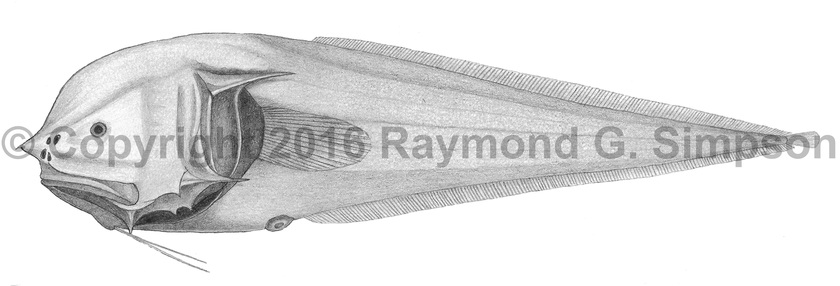
Common Name
Bony-eared Assfish
Year Described
Günther, 1878
Identification
Dorsal Fin: 100-108
Anal Fin: 93-99
Pelvic Fin: 2
Pectoral Fin: 16-19
Caudal Fin: 8
Gill Rakers: 4-5 upper limb, 16-22 lower limb
Branchiostegal Rays: 8-9
Vertebrae: 9-10 precaudal, 51-55 caudal vertebrae
Body elongated with a relatively huge head (over one-fourth TL). Body tapers rapidly after head, creating a tadpole shape. Snout large and rounded. Two strong spines on snout tip. Eye small. Mouth subterminal. Jaw extends well past posterior margin of orbit. Small teeth present in jaws, on palatine, and on vomer. One basibranchial tooth patch. A strong spine on upper opercle and multiple strong spines on preopercular margin. Dorsal and anal fins confluent with caudal fin. Caudal fin small. Pectoral fin moderate and rounded. Pelvic fin rays fairly short, on throat, and close together. Scales small.
Color
Body and head translucent whitish, with branchial area, gut, opercle, lower head, and eye blackish. Living specimens with yellowish markings on thoracic area and tail.
Size
Maximum size to 33.5cm TL.
Habitat
Occurs near the bottom on the abyssal plains (1957-4417m).
Range
Scattered records in the north Atlantic, the Gulf of Mexico, the Caribbean Sea (Colombia, Venezuela), and off Brazil.
References
Cohen, D. M., G. W. Mead, A. G. K. Menon, A. C. Wheeler, & P. J. Whitehead, P. J. 1966. On the genera Acanthonus and Typhlonus (pisces, Brotulidae). Galathea Report: Scientific Results of the Danish Deep-Sea Expedition Round the World 1950-52, 8, 33.
McEachran, J.D. and J.D. Fechhelm. 1998. Fishes of the Gulf of Mexico. Volume 1: Myxiniformes to Gasterosteiformes. University of Texas Press, Austin. i-viii + 1-1112.